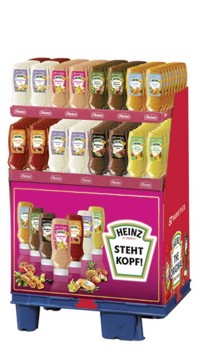 Food manufacturer Heinz has extended its cooperation with pallet pooling specialist CHEP, that will reduce the CO2 emissions associated with the transportation of its products by thousands of tonnes.
Food manufacturer Heinz has extended its cooperation with pallet pooling specialist CHEP, that will reduce the CO2 emissions associated with the transportation of its products by thousands of tonnes.
Probably the most famous ketchup in the world will now be delivered to supermarkets on CHEP blue Euro pallets. Heinz was already using CHEP pallets to transport a number of its products, and this has now been extended to include ketchup. In doing so Heinz will significantly reduce the CO2 emissions generated through its transportation activities. “Our partnership with CHEP in Germany has demonstrated that using their pallets results in a simplified, faster and above all more environmentally-friendly logistics operation,” said Jens Plachetka, Managing Director, H.J. Heinz GmbH. “This is why we are pleased to have extended our co-operation with CHEP.”
Heinz and CHEP have been working together for a number of years in Germany. This has included delivering a number of products including soups, stews and ready-meals manufactured by Sonnen Bassermann, a company which was taken over by Heinz in 1999, on CHEP’s blue half and quarter pallets. Like many other companies in Germany, Heinz is now switching to CHEP Euro pallets in addition to other CHEP pallet types and in doing so, is moving away from the white pallet exchange system. The European contract in place between CHEP and Heinz represents approximately 1 million pallet movements each year, with Germany the largest market with 200,000 movements.
 In addition to delivering improvements in efficiency, the reduction in impact which its operations will have on the environment was a key factor in the decision by Heinz to switch to CHEP. “Thanks to CHEP’s sophisticated pooling management system, the expensive re-location of exchange pallets and lorries on the road only partially loaded with empty pallets damaging the environment, are now a thing of the past,” explained Mr Plachetka.
In addition to delivering improvements in efficiency, the reduction in impact which its operations will have on the environment was a key factor in the decision by Heinz to switch to CHEP. “Thanks to CHEP’s sophisticated pooling management system, the expensive re-location of exchange pallets and lorries on the road only partially loaded with empty pallets damaging the environment, are now a thing of the past,” explained Mr Plachetka.
The CHEP environment calculator, which has been developed to work out the environmental savings to be gained by manufacturers considering switching from using exchange and one way disposable pallets to pooled CHEP pallets, shows that more than 16,200 tonnes of CO2 emissions will be prevented over a period of ten years, by Heinz in Germany alone switching to CHEP. It also calculates that by recycling the pallets, approximately 25,000 trees will be saved, which is equivalent to 88 hectares of forest.
CHEP is the global leader in pallet and container pooling services serving many of the world’s largest companies. The company has more than 7,500 employees and operates in 45 countries.
For more information about CHEP, please visit: www.chep.com




Comments are closed.